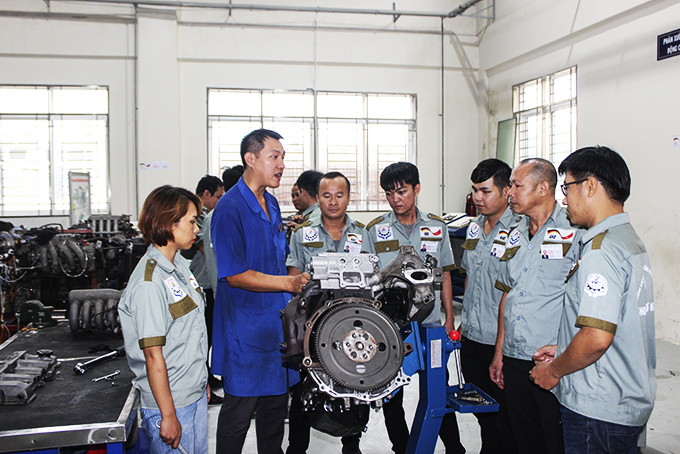
Over the past years, local authorities and vocational schools in Khanh Hoa Province have focused on improving teachers' professional development and vocational training, meeting labor market and workplace requirements...
Over the past years, local authorities and vocational schools in Khanh Hoa Province have focused on improving teachers’ professional development and vocational training, meeting labor market and employers' needs.
Improving professional skills and knowledge
Every year, Cam Ranh Vocational School with 31 staff recruits 400 people in 9 sectors. Every year, the schools builds professional development plans for managing and teaching staff to meet the training requirements. Most teachers have diplomas and certificates of national professional training and skills.
 A practice class at Nha Trang College of Engineering and Technology. A practice class at Nha Trang College of Engineering and Technology.
|
Tran Duc Anh, Deputy Chief of the Technique & Technology Faculty, a teacher of industrial electricity, Cam Ranh Vocational School said, “The scientific and technological development has inspired us to update knowledge in teaching. The local authorities and school always open training classes for teachers and improved training with more than 95% students getting employed when graduating.”
At Nha Trang College of Engineering and Technology, 100% of the staff and teachers meet professional standards with 3 holding doctoral degrees, 75 masters and the rest bachelor’s degrees. According to Rector Nguyen Van Luc, the school is a large-scale vocational education institution with 19 specialties for college-level training, 20 for intermediate level training and 37 for elementary level training. In particular, the school is invested in 7 key occupations, including 4 at international standards, 2 occupations at ASEAN standards and 1 at national standards.
Every year, the school recruits more than 3,000 students. The school always focuses on professional development for its staff. Every year, the school sends many staff to study abroad in Britain, Germany, Australia, Malaysia, etc.; and organized teacher contests to promote innovation in vocational education. The school also supports teachers in scientific research and innovation initiatives and has achieved high achievements at national competitions.
Regular professional development and training
There are 11 public vocational education facilities, including 3 colleges and 8 intermediate schools under the Department of Labor, War Invalids and Social Affairs with a total of 361 teachers in Khanh Hoa Province. Every year, training plans are built for teachers to develop professionally in order to well meet assigned tasks. Some schools also expand links with schools at home and abroad for teachers’ professional development. In addition, vocational training institutions also regularly send teachers directly to large enterprises and corporations to participate in training, helping teachers update knowledge and advanced science and technology, accumulate professional experience and practical production to apply, compile textbooks and teach students.
In addition, since 2018, Khanh Hoa Department of Labor, War Invalids & Social Affairs has provided support for 113 vocational teachers to take professional development courses for the national vocational skills certificates; 81 tool B1 English language certificates courses. Besides, hundreds of vocational teachers have been sent to professional development courses in management and pedagogy based on advanced teaching methods; skills in building and compiling curricular, textbooks and teaching materials; social work knowledge and so on.
Ta Hong Quang, Director of the Department of Labor, War Invalids and Social Affairs said that the department has been implementing many solutions on improving vocational training. Vocational schools have been promoting digital transformation, modernizing facilities and equipment and renovating training programs and methods; focusing on improving the quality of teachers, artisans, experts, vocational trainers and managers. In the coming time, the Department will continue organizing training courses to develop professional skills, especially vocational skills and knowledge, computer skills, foreign languages; build a contingent of qualified teaching staff according to national, ASEAN and international standards.
V.G
Translated by N.T










